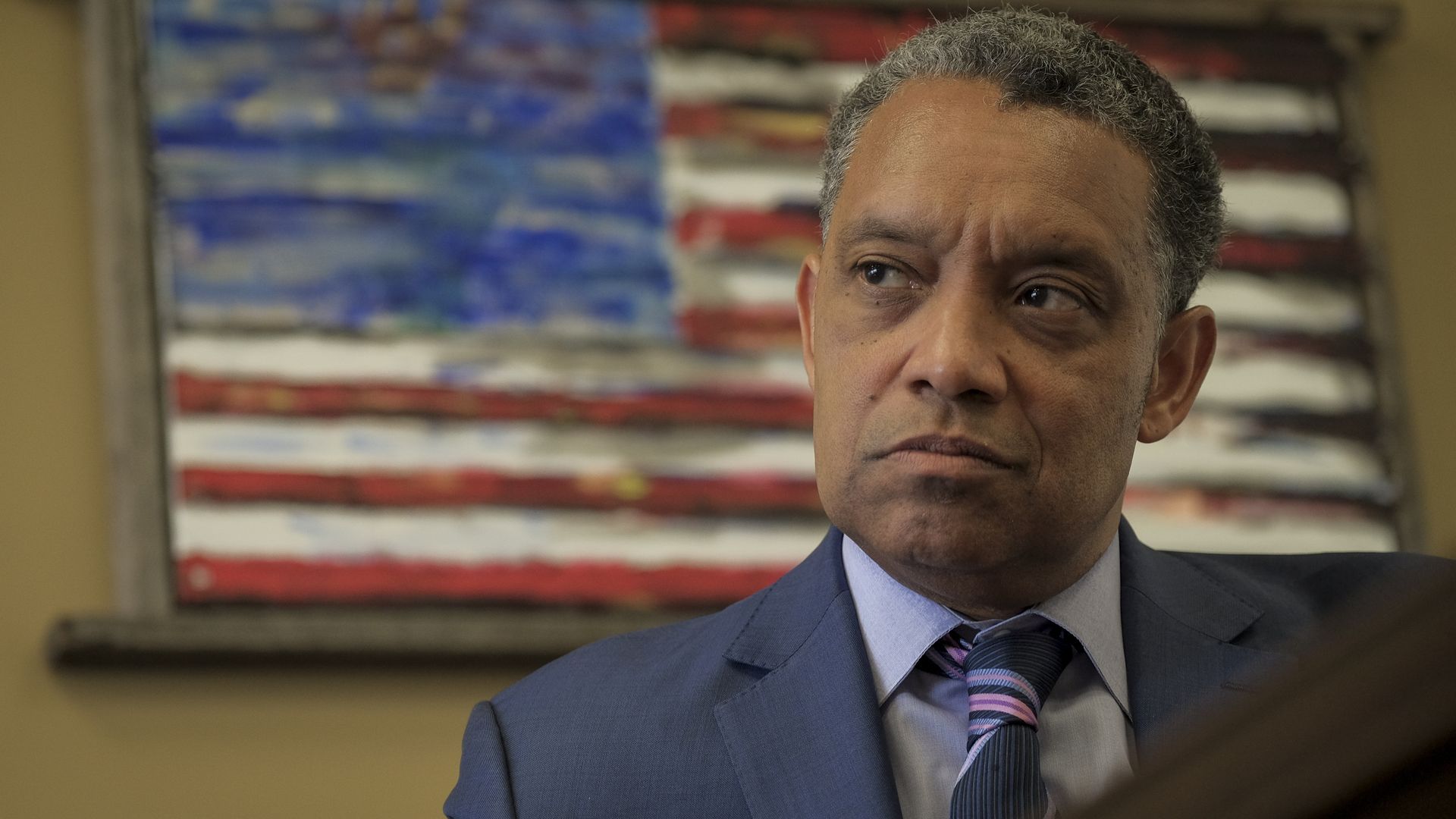Attorneys general fight hate crimes while facing hate

- Russell Contreras, author ofAxios Latino

Racine in his office in March 2019. Photo: Jahi Chikwendiu/The Washington Post via Getty Images
District of Columbia Attorney General Karl Racine, a Haitian immigrant, is leading one of the most diverse sets of attorneys general in the nation's history on a campaign against hate crimes while they face hateful rhetoric and threats themselves.
Why it matters: The country's electorate is becoming more diverse, yet hate crimes jumped to record levels last year. And the problem may even be worse. Most police departments don't bother reporting hate crimes.
The intrigue: Racine is the first immigrant president of the National Association of Attorneys General and one of the group's first Black presidents to lead the nonpartisan organization of 56 states and territories.
- He takes over the group following months of legal fighting with the Trump administration over the separating of immigrant children from their families, as well as his business dealings.
During his public fights with Trump, Racine has been bombarded with racist and hateful messages. And he's not the only attorney general who has experienced this.
- Connecticut Attorney General William Tong, who is Chinese American and a Democrat, was called "Kim Jong Tong" by a Republican opponent who compared him to the North Korean dictator.
- New Jersey Attorney General Gurbir S. Grewal, the first Sikh attorney general in U.S. history, was called "turban man" in 2018 by two conservative talk radio hosts.
- Michigan Attorney General Dana Nessel, the first openly LGBTQ person elected statewide in that state, has been slammed with hateful messages as she seeks to prosecute suspects in an alleged plot to kidnap the state's governor.
- New Mexico Attorney General Hector Balderas, the son of a Mexican immigrant, increased security around his office after receiving hateful messages.
Where it stands: Racine is urging all attorneys general to use their influence to draw attention to the spike in hate crimes and advocate for changing laws locally and nationally.
- "Chief law enforcement officers of every state have to reckon with (this) and help provide solutions. It's a big ass problem. We need to put a big ass light on it."
What they're saying: "All of us have experienced hate personally, and as an Asian American, the targets been on my back for a long time," said Tong, who supported strong hate crime proposals as a state legislator.
- "Over the last four years, we've seen an unprecedented rise in incidents of bias and hate, including graffiti, and ranging from school bullying to the deadliest terror attack in our state's history," Grewal said.
Some attorneys general can issue directives to their state law enforcement agencies to change, as Grewal did on bias reporting. Others, like Tong, have less authority and have to advocate for transformation.
By the numbers: Hate crime murders hit a record high in 2019, while overall hate crime incidents rose by nearly 3% last year, according to the FBI's annual hate crime report released in November.
- The jump came as the Southern Poverty Law Center said white nationalist hate groups rose by 55% between 2017 and 2019.
- Violence and discrimination against Asian Americans also have risen dramatically since the beginning of the coronavirus pandemic, Asian American advocacy groups say.
- Some participants in the Capitol riot last month wore anti-Semitic and racist clothing and waved Confederate flags.
Between the lines: The full problem on hate crimes isn't known, since 88% of law enforcement agencies reported no hate crimes or ignored requests to submit data, Brian Levin, the director of the Center for the Study of Hate and Extremism, California State University, told Axios.
- "There's a uniform method of counting them. It's just not being adequately applied across the country. We had Alabama report zero hate crimes last year."
- Levin said advocates would like to see a law or policy that connects federal aid with improved hate crime reporting.
- Some district attorneys or agencies also aren't knowledgeable about militia laws or classify something like the 2019 El Paso shooting as a mass shooting instead of a hate crime, said Balderas.
The bottom line: "There still needs to be increased education, awareness, and there needs to be a culture shift in how communities and law enforcement work together," said Balderas.
- Just as technology and banking laws have been used to fight international terrorism, he said, "I think we need to look at those for domestic terrorism."